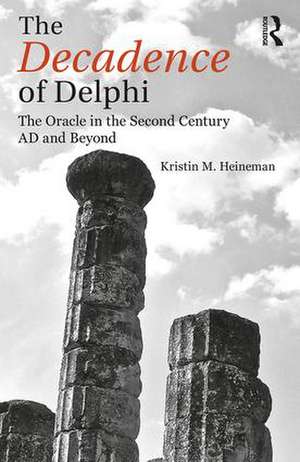The Decadence of Delphi: The Oracle in the Second Century AD and Beyond
Autor Kristin M. Heinemanen Limba Engleză Hardback – 29 sep 2017
| Toate formatele și edițiile | Preț | Express |
|---|---|---|
| Paperback (1) | 259.98 lei 6-8 săpt. | |
| Taylor & Francis – 30 iun 2020 | 259.98 lei 6-8 săpt. | |
| Hardback (1) | 763.39 lei 6-8 săpt. | |
| Taylor & Francis – 29 sep 2017 | 763.39 lei 6-8 săpt. |
Preț: 763.39 lei
Preț vechi: 1026.95 lei
-26% Nou
Puncte Express: 1145
Preț estimativ în valută:
146.12€ • 158.77$ • 122.82£
146.12€ • 158.77$ • 122.82£
Carte tipărită la comandă
Livrare economică 22 aprilie-06 mai
Preluare comenzi: 021 569.72.76
Specificații
ISBN-13: 9781472481801
ISBN-10: 1472481801
Pagini: 222
Dimensiuni: 156 x 234 x 18 mm
Greutate: 0.41 kg
Ediția:1
Editura: Taylor & Francis
Colecția Routledge
Locul publicării:Oxford, United Kingdom
ISBN-10: 1472481801
Pagini: 222
Dimensiuni: 156 x 234 x 18 mm
Greutate: 0.41 kg
Ediția:1
Editura: Taylor & Francis
Colecția Routledge
Locul publicării:Oxford, United Kingdom
Cuprins
Acknowledgments Abbreviations Introduction 1. The history of Delphi 2. Plutarch and the duality of Delphi 3. Delphi: sacred space and cultural memory 4. Theological oracles from Didyma 5. Theological oracles from Claros 6. Occult practices: astrology 7. Theurgy and soteriology Conclusion Index
Descriere
Examining the final years of Delphic consultation, this monograph argues that the sanctuary operated on two connected, yet distinct levels: the oracle, which was in decline, and the remaining religious, political and social elements at the site which continued to thrive. In contrast to Delphi, other oracular counterparts in Asia Minor, such as Claros and Didyma, rose in prestige as they engaged with new ‘theological’ issues. Issues such as these were not presented to Apollo at Delphi and this lack of expertise could help to explain why Delphi began to decline in importance. The second and third centuries AD witnessed the development of new ways of access to divine wisdom. Particularly widespread were the practices of astrology and the Neoplatonic divinatory system, theurgy. The monograph examines the correlation between the rise of such practices and the decline of oracular consultation at Delphi, analyzing several examples from the Chaldean Oracles to demonstrate the new interest in a personal, soteriological religion. These cases reveal the transfer of Delphi’s sacred space, which further impacted the status of the oracle. Delphi’s interaction with Christianity in the final years of oracular operation is also discussed. Oracular utterances with Christian overtones are examined along with archaeological remains which demonstrate a shift in the use of space at Delphi from a ’pagan’ Panhellenic center to one in which Christianity is accepted and promoted.
